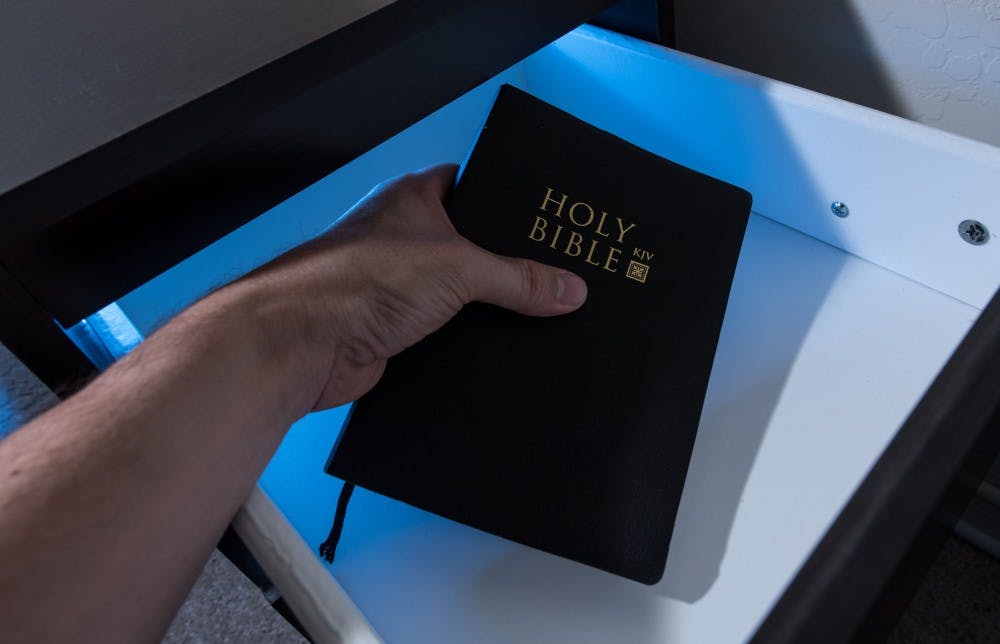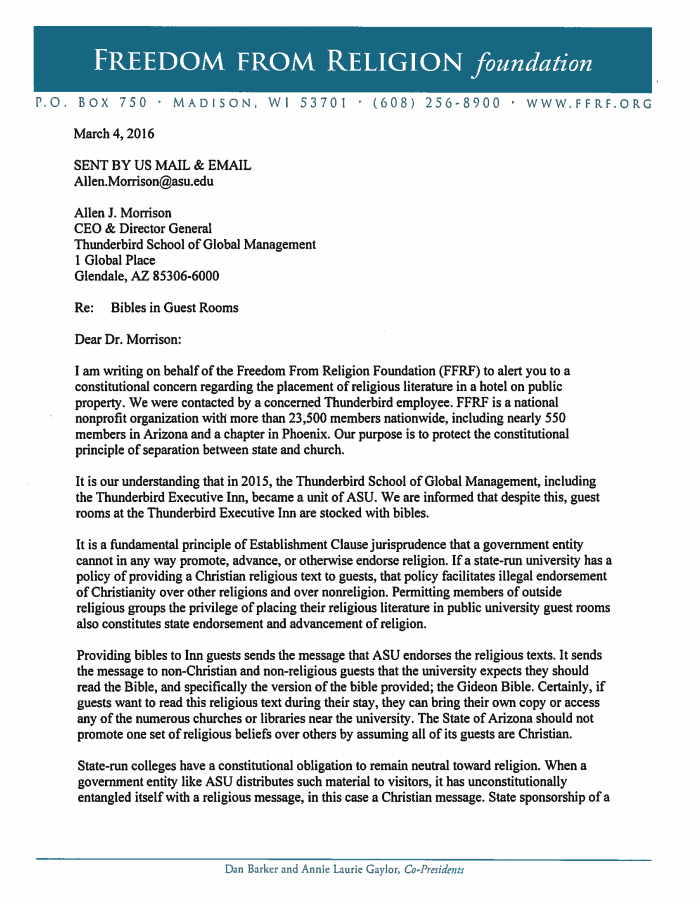Bibles have been found in the nightstands of hotel rooms since 1908 when Gideons International began distributing them. That tradition was broken late last month by a local ASU-affiliated hotel, Thunderbird Executive Inn and Conference Center.
The removal of the religious texts came after an employee of the hotel reported the presence of the Bibles to the Freedom From Religion Foundation. The foundation then sent a letter to the University, citing concerns over religious texts being disseminated on state property.
Elizabeth Cavell, a staff attorney for the foundation said the situation is a classic example of how it processes such complaints.
“The way it works is when we get a complaint from someone reporting something, the first thing we do is try to send a letter that is educational, that’s pointing out the constitutional problems and asking the school to take corrective action,” she said. “At that point, it was just a letter of complaint — nothing else was in the works — and it is always our hope to resolve these things without legal action.”
Although Cavell was not the filing attorney, she said the legal practice of FFRF focuses almost exclusively on cases similar to this.
“Our organization has two purposes; to protect the separation of church and state, and educate people on issues related to non-theism and non-religious Americans,” she said. “Our legal purpose is focused on the separation of church and state and a religiously neutral government.”
Carell said the University acted quickly after receiving the complaint and returned a letter, which satisfied her colleagues.
“We are happy with the outcome; the University took quick action and made their government-run hotel rooms religiously neutral, which is appropriate," Cavell said.
The Gideons International did respond to request for comment.
Jay Thorne, executive director of marketing and communications for the Thunderbird School of Global Management, said the hotel didn’t disagree with the complaint. He said the problem arose from the hotel being privately owned for nearly 70 years prior to ASU’s acquisition in 2014.
“Things that are okay to do at a private institution are not okay to do at a public university,” he said. “So we inquired with general counsel at ASU and were advised that we should remove them.”
He went on to talk about how the letter was not the only factor that prompted the removal and how they replaced the previous policies on Bibles.
“We also felt like it was a good time to review our own standards, and we are an international business school," Thorne said. "We have students, faculty and corporate partners from all over the world, so rather than having a book that speaks to one faith in the hotel room, we thought it was wise ... that books of all kinds are available."
Although this policy satisfied the complaint from the FFRF, it could still present legal roadblocks in the future. David Kader, professor emeritus for the Sandra Day O'Connor College of Law, said the case does not have an easy answer.
“There’s no case that speaks directly to these facts,” he said. “My reading of similar cases leads me to believe that it could still pose a problem even if they are not placed in other rooms, but available upon request."
Kader said the questions at play are questions of constitutional legality, not tradition.
“In other words, can you go into a state office and say 'I would like a bible?'" he asked. “It might be a problem under our state constitution.”
Speaking to the specifics of the problem, Kader said the Arizona Constitution’s Declaration of Rights could shoot down the possibility of religious paraphernalia being presented by state entities.
“The Declaration of Rights in our state constitution bars the state from distribution of Bibles or Qurans, or any other religious material on state property — be it in hotels or any other setting,” he said.
He also noted that a case could be made under the First Amendment and the principle of separation of church and state.
Paul Bender, dean emeritus of law at the Sandra Day O'connor school, said the question of constitutional legality has no definitive answer.
“If the issue were to be brought before the current Supreme Court, the answer would probably turn on whether the Bibles were distributed to hotel guests in a manner that would lead guests to think that the hotel was endorsing the Bibles," he said. "Or whether guests would think that the Bibles were in the rooms as a convenience to guests who might want them, not as Bibles endorsed by the state or the hotel."
He said if it was simply a matter of convenience, the Bibles would probably be viewed as constitutional.
“The answer would probably change, however, if the hotel put Bibles supplied by a Christian organization in its rooms," Bender said. "But refused to put Bibles supplied by a Jewish organization or Qurans supplied by a Muslim organization in the rooms."
Reach the reporter at isaac.windes@asu.edu or follow @isaacwindeschef on Twitter.
Like The State Press on Facebook and follow @statepress on Twitter.





